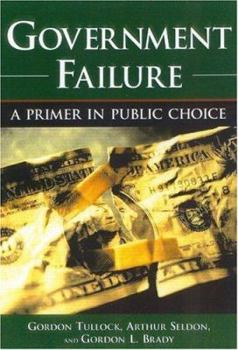Government Failure: A Primer in Public Choice
Select Format
Select Condition 
Book Overview
This book provides a much-needed introduction to public choice thought and public policy by three acknowledged leaders in the field.
Format:Paperback
Language:English
ISBN:1930865201
ISBN13:9781930865204
Release Date:May 2002
Publisher:Cato Institute
Length:193 Pages
Weight:0.65 lbs.
Dimensions:0.5" x 6.0" x 9.0"
Customer Reviews
3 ratings
Good Starter
Published by Thriftbooks.com User , 15 years ago
This is a great book to get the reader started into the Public Choice branch of economics and politics. It is a must read for people looking to jump into the much more complicated books on public choice.
A superb treatment of rent-seeking and log-rolling
Published by Thriftbooks.com User , 21 years ago
Since this is a book written by three authors separately, I shall discuss each part on its own, but first a few general remarks.My biggest gripe is that the primary topic is not "public choice" per se, but rather "rent-seeking" with some discussion about externalities and so forth. While the discussion is illuminating and generally crisp and comprehensible, the over-use of the term "public choice analyis" proved annoying: Hardly a page went by without "public choice analyis," sometimes twice in the same sentence.The general thrust of the text is that, however well-intentioned, no government can sustain a vibrant and diverse welfare-state over the long-term. Entrenched bureaucracies simply can't cope with the vagaries and varieties of human desires. Only the free market can hope to provide for the panoply of individuals' interests.Part I: A concise, lucid, introduction to the theory of public choice. Professor Tullock has a definitely "small-government" mentality (which I share), but his discussion is still even-handed. The sole problem I have is that the few tables and graphs he employs are completely unitelligible to me. Fortunately, they're not essential, as his writing should be clear enough. The most important topics are rent-seeking and log-rolling, the former of which is the topic most treated by the co-authors. Also of interest is the discussion about bureaucracies.Part II: A far ranging, perhaps wandering, discussion of the application of rent-seeking to American regulatory policy. Brady writes with a slightly more fervent tone than does Tullock, with a clear but tempered opinion of the roles lawyers, regulators, etc. Generally interesting, but the chapters somewhat lack coherence with each other beyond the theory.Part III: Sheldon here presents the most entertaining and forcefully written section of the book. Full of vigor, he brings ip several issues that are of critical interest to proponents of small government: the Fabian fallacy, the growth of addiction to the welfare-state, and the welfare-state's role in the collapse of the family.A great introduction for the interested student of politics or economics.
A cold, unforgiving look at governmental economic policies
Published by Thriftbooks.com User , 22 years ago
Collaboratively written by American economists Gordon Tullock, Gordon Brady, and British economist Arthur Seldon, Government Failure: A Primer In Public Choice is a cold, unforgiving look at governmental economic policies, ranging from how American special interest groups lobby reap enormous and destructive favors, to the manifold disasters that have come from British governmental interventions in the economy. A caution about he concentration of power promoted by the European Union rounds out this stark, scholarly, and persuasive treatise. Also available in hardcover (193086521X..,), Government Failure is strongly recommended reading for students of Economics and Political Science.






